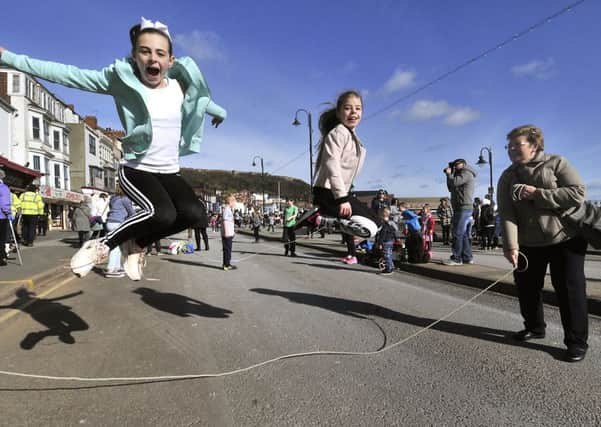Nostalgia: The luxury of leisure time


During and immediately after the wars with France, the plight of the poor intensified. Wages never kept pace with the rising prices of necessities such as bread, sugar, tea and tobacco which were weighed down by taxes and duties. The introduction of income tax in 1799 directly affected only the well-to-do, but they passed on their losses by increasing prices and lowering wages. It would be another 200 years before the living standards of the poor declined during a decade of austerity.
Also, the Reformation and its long-term consequences had robbed the working poor of their “holy days”, and this was particularly the case in towns rather than in the countryside where both Christian and pagan customs and superstitions lingered longer.
Advertisement
Hide AdAdvertisement
Hide AdScarborians kept only a few of the old religious customs, though even fewer now appreciated their meaning and significance. From Martinmas (November 11) eve until Christmas day, the town’s waits played street music and sang songs before the homes of principal burgesses. Bartholomew Johnson, the musician from Wykeham, who had died at the age of 104, had been one of Scarborough’s waits for many years. Between 1794 and 1800, Joseph Todd, the painter, and his two apprentices, John Pecket and George Gambles, were paid four pounds each and provided with blue cloaks by the Corporation to perform the ancient duties of the town’s waits.
The waits started out from the lower part of the borough, passed up Merchant’s Row, Newborough, Bland’s Cliff, King Street, Long Room Street, the Old (St Nicholas) Cliff, Harding’s Walk (Huntriss Row) and then crossed over to the north side of Newborough Street, finishing at Princess Street. Scarborough had no street lights at all until 1810, so that George Gambles had to carry the lantern for the other two to see the music sheets for their clarionets.
The blue-coat men also collected money for the town’s poor at Christmas, New Year and Candlemas (February 2), and were invited to play and sing at Corporation feasts and the annual feasts of the town’s craft societies and guilds. For those who could afford them, the waits were hired for weddings, birthdays and burials.
Scarborough’s Protestants, particularly its young apprentices and servants, continued the pre-Reformation Catholic customs which preceded the 40 days of Lent, known as Shrovetide. On Collop Monday, it was the tradition in some households to eat eggs fried in thick slices of bacon and on Shrove Tuesday, the next day, the fat from collop frying was used to make pancakes. Shrove Tuesday was the last day before the onset of Lenten fasting.
Advertisement
Hide AdAdvertisement
Hide AdOriginally, the church bells had rung to summon penitents to a pre-Lenten shriving or blessing, but at Scarborough the bell belonged to the workhouse. As elsewhere, by 1800, bell-ringing at midday was the call to stop work, make pancakes and assemble on the foreshore sands for a variety of popular games.
All over the country there were pancake races, but at Scarborough, on what was also called “Ball day”, apprentices, servants and children celebrated their half-day of freedom by tossing, kicking and passing balls. Rope-skipping on Shrove Tuesday at Scarborough today might well be a revival of a much older tradition. At other places, the final day before the beginning of Lent was celebrated with cock-fighting, marathon football matches, primitive forms of hockey and top-whipping.
Other ancient customs still practised at Scarborough in 1800 were known generally elsewhere. Carling Sunday, the fifth in Lent and the one preceding Palm Sunday, was “celebrated” by eating “grey peas”, which had been steeped in water and then fried with butter, bacon or ham. The peas (or beans sometimes) were called Carlings. There are many fanciful and fictional explanations for Carling consumption, which was common along the North Sea coast between Newcastle and Hull, but the tradition probably derives from the pagan custom of eating peas or beans in commemoration of the dead, in Christian terms the imminent death of Jesus.
Egg-rolling was a very old tradition practised at Easter all over the country. At Scarborough, painted yellow, violet or red, the hard-boiled eggs were rolled down the Castle dykes or from the top of Peasholm Hill. Since the latter was surrounded at its base by the muddy waters of the Engrift (Peasholm beck) before it ran into North Bay under the borough causeway, the Castle dykes were usually preferred. However, the Ship Inn in Peasholm Valley seems to have been a very popular gathering-place for young men and women at other times of the year such as Whitsuntide. There they played ball games and danced to fiddlers’ tunes.
Advertisement
Hide AdAdvertisement
Hide AdOtherwise, Whitsuntide seems to have passed almost unnoticed in Scarborough by the end of the eighteenth century. Whit Sunday, the seventh after Easter, the equivalent of the Jewish Pentecost and traditionally the day when the Apostles were filled with knowledge by the Holy Spirit, was marked by many different activities throughout the country. In Cleveland, you wore new clothes, preferably white, or at least old clothes with a white flower or ribbon; in Bristol you brought flowers and rushes to decorate the church; in Gloucestershire, you rolled cheeses. At the end of the week, usually on Whit Friday or Saturday, there were the so-called Whit Walks, performed by thousands at Salford and Manchester and the forerunner of modern parades and galas.